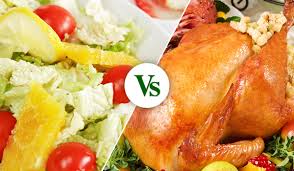Vegetarian Vs. Non-Vegetarian

I a non-vegetarian but have switched to vegetarian in my food choices and only occasionally consume non-veg when I know the place serves well-prepared good choice in non-veg dishes. In the last fifteen- twenty years I have witnessed numerous debates about which food habit is better –a vegetarian or that of a non vegetarian. It would be unethical on my part, if I do not credit the bunch rather gang of friends I have, including practising doctors, nutritionist and dieticians who formed an integral part of these debate cum discussions which ended in debacles.
Today, I am just writing the essence of these discussions about the pros and cons of both food choices:
The benefits of being a vegan:
- The vegans due to their dietary patterns are less known to get obese as the vegetarian diet mostly consists of vegetables, fruits and grains which are high in fiber and low on calorie meter. Hence, to shed those extra kilos and to save your energy spent on treadmill you can switch to vegetarian diet. It is also known to be rich in folic acid, vitamins C and E, magnesium, unsaturated fat, and countless phyto-chemicals
- A vegetarian diet helps the person in attaining healthy bones with good bone density as it is known to provide the person with better rate of calcium absorption.
- Vegetarians are less prone to cardiovascular diseases as their food is rich in antioxidants. For a healthy heart, go green.
- Though I can’t vouch for the extent of truth it has but as per Hinduism, Vegetarian diet is more sattvik and improves spiritual health. A vegan tends to be kind as it does not believe in killing other living beings for his food.
Cons of vegetarian food
- Vegetarian diet is known to lack in vitamin B12 and essential omega3 fatty acids. It’s known to play a significant part in the formation of red blood cells.
- Iron from plant food is known to have low absorption rate, so vegetarians need to increase their iron intake and also consume a Vitamin C-rich food source to enhance iron absorption.
- Fats in the form of Ghee and oils are known to create havoc with your body blocking your arteries and are infamous for bad cardio health.
- Dining out for a vegan is difficult as one can never be sure of your food contents, one can never trust the sauces used to make that green pasta salad of your so mouth drooling.
The benefits of being a non vegetarian:
- The protein content of non vegetarian diet is high, thus it helps in muscle building. Contrary to the popular belief you can have a dashboard tummy if you choose right kind of meat followed by a correct dietary pattern and lifestyle.
- Animal products are rich in vitamin B12 and omega 3 fatty acids. Iron found in blood as hemoglobin has heme and non heme part. Heme is found only in animals. So, for that pink glow on your cheeks you can think of switching to non vegetarian (if you are not one)
- Non veg diet is rich in zinc and selenium. Zinc aids in tissue formation and metabolism whereas selenium is known for breaking down fat and other chemicals.
- Non vegetarians can find their food anywhere and everywhere. They have wide variety of food to choose from because they have both veg and non veg options.
Cons of non vegetarian food
- Eating red meat is known to be associated with a higher risk of heart disease, diabetes, kidney disorders, cancer and weight gain.
- Non vegetarian diet is difficult to digest and body’s metabolism has to work hard to digest it. Thus leading to bowel disorders.
- Researches show that production of meat and battery chicken release more greenhouse gases into the atmosphere than transport.
- Breeding of animals is a complex procedure. For quick breeding they are fed with hormones and certain harmful chemicals which make the animals fat, these animals harm human body when ingested as food.
Conclusion-
Humans have 32 teeth out of which 8 i.e. canines and premolars are designed to consume meat. Rest of the 24 are more suited to vegetarian diet. So how about working on our diet and include 1/4th non-vegetarian and 3/4 vegetarian food. Our anatomy hints at the ratio after all. The key behind any healthy eating plan, vegetarian or non vegetarian, is to ensure inclusion of variety of nutrients from every major food group. This will keep deficiency diseases at bay and adapting to a healthier lifestyle will surely work wonders.









